Polish Music Center Newsletter Vol. 13, no. 2
Szymanowski Year
Szymanowski Celebrated, Finally!
Karol Szymanowski (1882-1937) was one of the greatest modern Polish composers. By building upon the achievements of Chopin and Moniuszko, he is credited with ushering Polish music into the twentieth century. Szymanowski’s body of work and his unique historical position make him the father of modern music in Poland. In fact, the great diversity of compositional trends and styles in Polish contemporary music can be directly linked to Szymanowski’s wide-ranging opus that encompasses late romanticism, impressionism, Orientalism, and the assimilation of Polish folk music elements into his later works.
Szymanowski grew up on the family estate, Tymoszówka, located in the far eastern provinces of Poland — lands that became part of the Soviet Russia after the October 1917 Revolution and resulted in the expropriation of the Szymanowski family from their ancestral home. By the time Szymanowski and his family moved to Warsaw in 1919, he was already a well-known composer with a substantial body of work to his credit. At the turn of the century he had studied composition in Warsaw, making friends with several young composers (like Ludomir Różycki and Apolinary Szeluto) and performers (like Artur Rubinstein and Paweł Kochański). A group of promising young composers with Szymanowski at the center became widely known as Młoda Polska [Young Poland], and their concerts were an important part of the newly-emerging musical life in Poland.
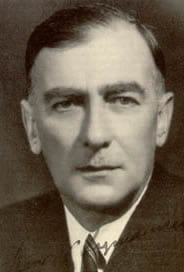 Szymanowski’s early success in Warsaw and Berlin was soon overshadowed by Polish press critics who were not quite ready to hear modern music. The April 22, 1907 issue of Kurjer Warszawski [The Warsaw Courier] issued a scathing indictment of Szymanowski and his Young Poland fellow composers: “What kind of ‘Poland’ is this that does not serve the nation as Chopin and Moniuszko did, but slavishly follows Vienna fashions and propagates the ideas of musical Bundists … [those] composers are possessed by some evil spirit that deprived their work and stripped it of personal and national characteristics.”
Szymanowski’s early success in Warsaw and Berlin was soon overshadowed by Polish press critics who were not quite ready to hear modern music. The April 22, 1907 issue of Kurjer Warszawski [The Warsaw Courier] issued a scathing indictment of Szymanowski and his Young Poland fellow composers: “What kind of ‘Poland’ is this that does not serve the nation as Chopin and Moniuszko did, but slavishly follows Vienna fashions and propagates the ideas of musical Bundists … [those] composers are possessed by some evil spirit that deprived their work and stripped it of personal and national characteristics.”
Meanwhile, Szymanowski’s Second Symphony and Overture were performed in Berlin, Vienna, Kraków and Lwów, and his recognition as the leading Polish composer continued to grow. Continuing to travel widely, he visited London and Paris (where he met Stravinsky) and made several trips to Italy and northern Africa on the eve of World War. These exotic journeys to lands of ancient cultures provided Szymanowski with inspiration that would develop and mature during the war years in Tymoszówka. The Love Songs of Hafiz, Third Symphony, the piano cycle Métopes, the Mythês for Violin and Piano, and the First Violin Concerto with their luxuriantly Oriental musical language are a direct result of Szymanowski’s contact with the Mediterranean world. Most of Szymanowski’s new compositions were scheduled to be premiered by the violin virtuoso, Paweł Kochański, the great Russian conductor (and Rachmaninov’s cousin), Alexander Siloti, and the composer himself. Publishing contracts were negotiated with the leading St. Petersburg publisher, Jurgenson, and Szymanowski’s career was about to take off. But the Russian Revolution broke out, and Szymanowski and his family had to flee to Elizavetgrad, where they remained for the next two very difficult and dangerous years.
Szymanowski’s first concert in the newly liberated capital of Poland in early 1920 was neither well attended nor well received. And so began a pattern of Szymanowski’s music being fêted on his foreign journeys, but criticized and disdained in Poland. In the early 1921 Szymanowski visited the United States concertizing, sight-seeing as far as Miami and Havana, and making friends among the powerful cultural elite. He also met Paderewski in New York. Meanwhile, concerts of Szymanowski’s music in Paris in 1922 further cemented his growing reputation.
Later that year, Szymanowski also came to discover a little mountain village in the southern mountains of Poland. Just like the south of Italy in his young adulthood, Zakopane was to charm and inspire the now mature composer in many ways, leading to a significant change in his musical language. The orchestral song cycle Słopiewnie, StabatMater for soloists, chorus and orchestra, the ballet Harnasie, and piano Mazurkas echo Szymanowski’s enthusiasm for the fascinating folklore and music of the Tatra mountain region.
In late 1926 Szymanowski received two exciting job offers—both the Cairo Conservatory and the Warsaw Conservatory were interested in hiring him to serve as the director. In spite of better financial terms and a more favorable climate in Egypt, Szymanowski chose the Warsaw post. He immediately set to modernize the school, introduce contemporary music into the curriculum, and bring teaching levels to world standards. Very soon he also encountered stiff opposition from traditionalists, and his battles with various officials and conservative press critics adversely affected his already fragile health. By 1928 he was forced to suspend working and take a long period of rest; in 1930 he was diagnosed with tuberculosis and confined to a sanatorium in Davos, Switzerland. Although a measure of official recognition came in form of an honorary doctorate from the Jagiellonian University in Kraków in 1930, more bureaucratic obstacles at the Warsaw Conservatory led to Szymanowski’s resignation in 1932.
By this time, in addition to Szymanowski’s health, his financial situation had become very precarious as well. He completed the Symphonie concertante for piano and orchestra in 1932, hoping to earn some much needed funds by premiering the work all around Europe. That year, he also finished his Second Violin Concerto, and saw the premiere of the opera Król Roger in Prague. His ballet, Harnasie, was finally staged at the Paris Opera in 1936. Throughout this time Szymanowski was touring with concerts from Moscow and Copenhagen to Berlin, Vienna, Sofia, Bologna, Paris, London, and Amsterdam. Utterly exhausted and unable to perform or compose, Szymanowski finally tried to recover his health by resting in the southeastern French resort town of Grasse in late 1936. Unable to afford a stay in a convalescent home, he lived in an inexpensive hotel instead. By March 1937 his condition became critical and he was transferred to a sanatorium in Lausanne, Switzerland, where he died on March 29, 1937. Paderewski was the first to rush and pay respects to his younger colleague.
After his death, Karol Szymanowski’s compositions had little chance of public performance in Poland — only two years later the Second World War broke out. German bombing of Warsaw in September 1939 and further devastation of the city following the Warsaw Uprising in 1944 destroyed many of Szymanowski’s manuscripts and memorabilia. After the war, a new generation of Polish avant-garde composers came to the fore and Szymanowski’s achievements, though generally known, formed only a faint backdrop of the Polish musical life.
The next chance for properly assessing Szymanowski’s contributions to Polish music came in 1982, the centenary of his birth. It was to be the first great milestone in recognizing the immense influence that Szymanowski’s music had had on subsequent generations of Polish composers. Alas, the Communist government of Poland declared martial law in December 1981, abolishing not only the Solidarity movement, but also preventing public assembly, unauthorized travel, and other civic gatherings for several years.
This year—the year of the 125 th anniversary of Szymanowski’s birth and the 70 th anniversary of his death—the Ministry of Culture and National Heritage has officially proclaimed 2007 a “Szymanowski Year.” Perhaps now, after many years of neglect, we finally have the most propitious conditions for rediscovering and celebrating the legacy of this long-neglected composer, not only in an independent Poland but all around the world.
[ mz ]
Szymanowski & Modern Polish Music
The Polish Music Center will be honoring this year’s Szymanowski anniversary with a special concert, “Szymanowski & Modern Polish Music,” on March 22nd at 7:30pm . The concert will take place in Alfred Newman Hall at the University of Southern California. Performers will include both USC students and professional artists from the area. The program will feature major works by Symanowski as well as works by composers who followed his lead, ushering Polish music into the modern era.
PWM Celebrates Szymanowski Year
To celebrate the Year of Karol Szymanowski, as established by Polish Parliament in 2007, PWM announces the following new releases of composer’s works and related materials and events:
- World premiere of the operetta Loteria na mężów [Husband Lottery] during the 3rd Festival of Polish Musicin November 2007
- Publication of facsimile of the original orchestration of the 2nd movement of the 2nd Symphony, which was re-orchestrated by Grzegorz Fitelberg
- Publication of the score to the Loteria na mężów as part of the “Szymanowski Works” series
- Update and re-release of the 1st volume of Szymanowski correspondence by Teresa Chylińska
- Publication of an arrangement of Pieśni Kurpiowskie [Kurpie Songs] for violin and piano by Roman Padlewski
- Re-release of Szymanowski’s piano and chamber works
- Preparation to the publication of the 1st and 2nd Symphonies as part of the “ Szymanowski Works” series
- Inclusion of other Szymanowski’s works in the program of the 3rd Festival of Polish Music in November 2007
News
Lutosławski Cello Competition
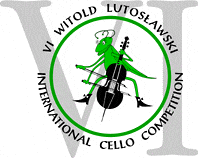 The 6th edition of the International Lutosławski Cello Competition will open in Warsaw on February 22, 2007. The goal of the competition is to allow young cellists to compete on an even playing field. Since the age limit for the competition is 24, its participants are mainly up-and-coming instrumentalists, just beginning their career. The program of the competition includes all of the cello works by Lutosławski as well as most of the representative cello repertoire from all musical periods. This year the jury consists of: Kazimierz Kord, Julius Berger, Kazimierz Michalik, Philippe Muller, Csaba Onczay, Natalia Shakhovskaya, Tsuyoshi Tsutsumi and Andrzej Zieliński. There are 46 contestants, 11 of which are Polish.
The 6th edition of the International Lutosławski Cello Competition will open in Warsaw on February 22, 2007. The goal of the competition is to allow young cellists to compete on an even playing field. Since the age limit for the competition is 24, its participants are mainly up-and-coming instrumentalists, just beginning their career. The program of the competition includes all of the cello works by Lutosławski as well as most of the representative cello repertoire from all musical periods. This year the jury consists of: Kazimierz Kord, Julius Berger, Kazimierz Michalik, Philippe Muller, Csaba Onczay, Natalia Shakhovskaya, Tsuyoshi Tsutsumi and Andrzej Zieliński. There are 46 contestants, 11 of which are Polish.
Znaniecki & Domingo
 Franco Alfano’s opera Cyrano De Bergerac will have its premiere on February 11, 2006. The title part is played by Placido Domingo and the production was directed by Michał Znaniecki. The premiere of the opera will be recorded and released as a DVD HD for American and Japanese markets. The premiere will take place in the futuristic Palau des Artes in Valencia, the most modern opera theater in Europe (pictured at right). Cyrano is the first production by Znaniecki in Spain but there are already plans for productions in Bilbao, Santander and Madrid. Znaniecki and Domingo also have plans for upcoming productions in Washington and Los Angeles.
Franco Alfano’s opera Cyrano De Bergerac will have its premiere on February 11, 2006. The title part is played by Placido Domingo and the production was directed by Michał Znaniecki. The premiere of the opera will be recorded and released as a DVD HD for American and Japanese markets. The premiere will take place in the futuristic Palau des Artes in Valencia, the most modern opera theater in Europe (pictured at right). Cyrano is the first production by Znaniecki in Spain but there are already plans for productions in Bilbao, Santander and Madrid. Znaniecki and Domingo also have plans for upcoming productions in Washington and Los Angeles.
Michał Znaniecki (pictured at left) is a graduate of Warsaw State Theater School. He also graduated from the University of Bologna with Umberto Eco and studied with Giorgio Strehler at the Teatro Piccolo di Milano, where he staged his diploma work – Emigrants by Mrożek. At the age of 24 he was the youngest director to debut at the La Scala. He has created over 100 dramatic and musical productions. He served as the director of theater and opera festivals in Como and Milan. He is the artistic director of Con-Teatro Society in Turin. His last production in Poland was Mozart’s Cosi fan tutte at the Wrocław Opera.
PWM Presents Konieczny
 Celebrations of the 70th birthday of Polish composer and songwriter Zygmunt Konieczny continue. PWM [Polish Music Editions] has announced a new book, Conversations with Zygmunt Konieczny, and another volume of The Great Songbook of Agnieszka Osiecka, which will include many songs composed by Konieczny. For the fall PWM is planning “Wyspiański – Konieczny,” a concert presentation of Konieczny’s music written for several plays by Wyspiański, including Noc listopadowa [November Night], Legenda [Legend] and musical tale Serce moje gram [My heart I play].
Celebrations of the 70th birthday of Polish composer and songwriter Zygmunt Konieczny continue. PWM [Polish Music Editions] has announced a new book, Conversations with Zygmunt Konieczny, and another volume of The Great Songbook of Agnieszka Osiecka, which will include many songs composed by Konieczny. For the fall PWM is planning “Wyspiański – Konieczny,” a concert presentation of Konieczny’s music written for several plays by Wyspiański, including Noc listopadowa [November Night], Legenda [Legend] and musical tale Serce moje gram [My heart I play].
Krauze At National Opera
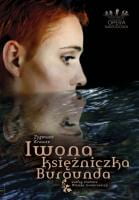 The Polish National Opera will be premiering its staging of Zygmunt Krauze’s new opera, Iwona, księżniczka Burgunda[Yvonne, Princess of Burgundy] on February 1, 2007. Based on the play by Witold Gombrowicz, it was commissioned by the City of Warsaw to celebrate the 100th anniversary of the great writer’s birth. The premiere of the concert version of this opera took place at the Théâtre Sylvia Monfort in Paris (2004). The stage version premiered on September 29, 2006 at the Teatr Narodowy in Warsaw, as a part of the Warsaw Autumn Festival of contemporary music. Zygmunt Krauze has translated the grotesque, funny but also tragic world of Gombrowicz’s play into the language of opera theatre.
The Polish National Opera will be premiering its staging of Zygmunt Krauze’s new opera, Iwona, księżniczka Burgunda[Yvonne, Princess of Burgundy] on February 1, 2007. Based on the play by Witold Gombrowicz, it was commissioned by the City of Warsaw to celebrate the 100th anniversary of the great writer’s birth. The premiere of the concert version of this opera took place at the Théâtre Sylvia Monfort in Paris (2004). The stage version premiered on September 29, 2006 at the Teatr Narodowy in Warsaw, as a part of the Warsaw Autumn Festival of contemporary music. Zygmunt Krauze has translated the grotesque, funny but also tragic world of Gombrowicz’s play into the language of opera theatre.
Here are Witold Gombrowicz ‘s words about his play:
A few words are enough to tell the tragicomic story of Yvonne. The successor to the throne meets this unattractive and repulsive girl when strolling about. Yvonne is languid, listless, timid, insipid and fainthearted. From the very first moment the Prince can’t tolerate her; he finds her aggravating but at the same time he cannot bear the fact he has to loathe unfortunate Yvonne. And he rebels against that law of nature which makes young men love only attractive girls: “I shall not yield – I’ll love her!” and he challenges his nature by getting engaged to Yvonne.
Introduced to the royal court as the Prince’s fiancée, Yvonne becomes a disintegrating factor. The silent, intimidating presence of her numerous deficiencies brings to everybody’s mind their own deeply concealed shortcomings, dirty dealings and petty sins. Soon the court transforms into a hotbed of atrocities. And each of those monsters in human shape, including the Prince himself, starts burning with desire to murder this intolerable neither-here-nor-there. Finally, the court puts forth all their splendour, all the glamour and superiority and kills her in their majesty.
That is the story of Yvonne – is it really so difficult to comprehend?
[adapted from the Teatr Wielki-Opera Narodowa website ]
Kaczmarek’s New Project
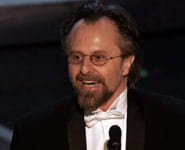 Oscar-winning Polish composer Jan A.P. Kaczmarek will be scoring a new film by Hungarian director Lajos Koltai. The film is an adaptation of a novel by Susan Minot and will star such Hollywood greats as: Vanessa Redgrave, Meryl Streep, Glenn Close, Toni Colette, Natasha Richardson and Claire Danes. The premiere of the movie is scheduled for June 2007.
Oscar-winning Polish composer Jan A.P. Kaczmarek will be scoring a new film by Hungarian director Lajos Koltai. The film is an adaptation of a novel by Susan Minot and will star such Hollywood greats as: Vanessa Redgrave, Meryl Streep, Glenn Close, Toni Colette, Natasha Richardson and Claire Danes. The premiere of the movie is scheduled for June 2007.
Podleś In Seattle
 Polish contralto Ewa Podleś will be performing the title role of George F. Handel’s Julius Caesar at the Seattle Opera on February 24 and 28, and March 3, 7, and 10. This performance follows her previous successes with this opera house, in Bellini’s Norma, for which she earned Seattle Opera’s Artist of the Year award, and in Wagner’s Ring of the Nibelung.
Polish contralto Ewa Podleś will be performing the title role of George F. Handel’s Julius Caesar at the Seattle Opera on February 24 and 28, and March 3, 7, and 10. This performance follows her previous successes with this opera house, in Bellini’s Norma, for which she earned Seattle Opera’s Artist of the Year award, and in Wagner’s Ring of the Nibelung.
Ewa Podleś is recognized as the world’s foremost contralto, with a very wide vocal range and great vocal agility. Her repertoire ranges from Baroque works to songs by Shostakovich, and her voice has been heard in the world’s best opera houses. Since her 1984 debut at the Metropolitan Opera, her engagements have included La Scala, Covent Garden, Deutsche Oper Berlin, and Carnegie Hall.
In conjunction with her performance at the Seattle Opera, Ms. Podleś will be supporting the Polish Studies Endowment at the University of Washington. Ms. Podleś will be the guest of honor at an elegant luncheon hosted by the Endowment Committee at a private residence on February 25th, providing a rare opportunity to meet the artist in person. A $100 per person donation will include an opera ticket for the opening night of Julius Caesar on February 24th and the luncheon with Ms. Podleś on the 25th. To make reservations please contact Ewa Poraj-Kuczewska at ekuczewska@polishstudiesuw.org or call 206.362.3829 by January 20, 2007.
All proceeds from the event celebrating Ms. Podleś will benefit the UW Polish Studies Endowment. For more info visit www.polishstudiesuw.org.
Argentine Polonia
In 2007, the Argentine Polish Cultural Association celebrates the fourth year of their weekly Polish music broadcasts on Argentine National Radio. This anniversary corresponds with several others which the radio program will be commemorating over the course of the year.
In conjunction with celebrations all over the world, the Argentine Polish Cultural Association will present a retrospective on Karol Szymanowski, whose 125th birth anniversary and 70th death anniversary fall in 2007, the official ‘Year of Szymanowski.’ February 25th will also mark the 200th birth anniversary of Ignacy Feliks Dobrzyński and October will be the 140th anniversary of his death. A pupil of Józef Elsner and class companion to Chopin, Dobrzyński is a tragically forgotten figure whose music deserves to be remembered. Several programs in February will be dedicated to his chamber works and the first piano concerto, written in 1824. Later in the year, an Argentinean chamber music ensemble will perform Dobrzyński’s Quintet, Op 40.
Lang Lang In LA & Warsaw
 International piano star and champion of Chopin, Lang Lang , will be performing Chopin’s Piano Concerto No. 1 with Vassily Sinaisky and the Los Angeles Philharmonicfor 4 performances in February (Feb 8-11). Also included on the program are Berlioz’s Le Corsaire Overture and Rachmaninoff’s Symphonic Dances.
International piano star and champion of Chopin, Lang Lang , will be performing Chopin’s Piano Concerto No. 1 with Vassily Sinaisky and the Los Angeles Philharmonicfor 4 performances in February (Feb 8-11). Also included on the program are Berlioz’s Le Corsaire Overture and Rachmaninoff’s Symphonic Dances.
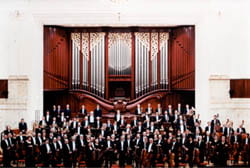 Lang Lang will be performing several times this month in the hall of the Warsaw Philharmonic. On the first night, February 20, Lang Lang will present a solo Gala Master Recital, including works by Mozart, Chopin, Schumann, Rachmaninov and Liszt. For the next two performances, February 23 & 24, Lang Lang will be joined by the Warsaw Philharmonic to present Piano Concertos of Chopin (Op. 11) and Czajkowski (Op. 23).
Lang Lang will be performing several times this month in the hall of the Warsaw Philharmonic. On the first night, February 20, Lang Lang will present a solo Gala Master Recital, including works by Mozart, Chopin, Schumann, Rachmaninov and Liszt. For the next two performances, February 23 & 24, Lang Lang will be joined by the Warsaw Philharmonic to present Piano Concertos of Chopin (Op. 11) and Czajkowski (Op. 23).
Stańko At Portland Jazz
 A living icon of Polish – and European – jazz, Tomasz Stańko‘s reputation has been secure for decades. There is universal agreement now, however, that he is playing at the peak of his powers. Since his first recording for ECM in the 1970s, Stańko has been hailed as both a composer and performer whose work displays a simplicity of form and mellowness that comes from years of work, exploration, and experience. As the other members of the Tomasz Stanko Quartet, pianist Marcin Wasilewski, bassist Sławomir Kurkiewicz, and drummer Michał Miskiewicz have continued to demonstrate a magical rapport with their elder mentor, a vibe that is something to behold and hear.
A living icon of Polish – and European – jazz, Tomasz Stańko‘s reputation has been secure for decades. There is universal agreement now, however, that he is playing at the peak of his powers. Since his first recording for ECM in the 1970s, Stańko has been hailed as both a composer and performer whose work displays a simplicity of form and mellowness that comes from years of work, exploration, and experience. As the other members of the Tomasz Stanko Quartet, pianist Marcin Wasilewski, bassist Sławomir Kurkiewicz, and drummer Michał Miskiewicz have continued to demonstrate a magical rapport with their elder mentor, a vibe that is something to behold and hear.
The 4th annual Portland Jazz Festival recognizes ECM Records for their nearly four decades of making an indelible imprint on contemporary jazz with a two-day series titled “Crystal Silence: The Story of ECM Records,” February 16–17. The Festival as a whole offers more than 125 events, with performances by top artists like Branford Marsalis, pianist Geri Allen with her trio; trumpeter Dave Douglas; and saxophone legend Charles Lloyd on a double bill with the legendary Tomasz Stańko.
[excerpted from the Polish Cultural Institute website ]
Kovacic Leads Leopoldinum
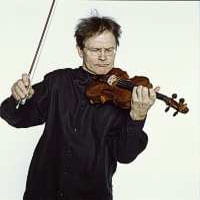 Ernst Kovacic was appointed the new artistic director of the Wrocław Chamber Orchestra Leopoldium. His debut concert with the ensemble took place on January 14, 2007. Kovacic is a respected violinist and chamber musician, and has performed with Scottish Chamber Orchestra, English String Orchestra, Deutsche Kammerphilharmonie and Oslo Chamber Orchestra. As a soloist, he has performed with Simon Rattle, Roger Norrington, Dennis Russell Davies and Esa-Pekka Salonen. He is also a professor at the Vienna University.
Ernst Kovacic was appointed the new artistic director of the Wrocław Chamber Orchestra Leopoldium. His debut concert with the ensemble took place on January 14, 2007. Kovacic is a respected violinist and chamber musician, and has performed with Scottish Chamber Orchestra, English String Orchestra, Deutsche Kammerphilharmonie and Oslo Chamber Orchestra. As a soloist, he has performed with Simon Rattle, Roger Norrington, Dennis Russell Davies and Esa-Pekka Salonen. He is also a professor at the Vienna University.
Sarasota Goes Polish
Sarasota Opera will be presenting Stanisław Moniuszko’s Halka as part of its 2007 Winter Opera Festival. In addition, arts organizations throughout Sarasota, with the assistance of the Polish Embassy, will celebrate Poland and its arts with special exhibits and presentations throughout the month of February. See here for event details.
Part of Sarasota Opera’s Masterworks Revival Series, which presents neglected operas of artistic merit, Halka is considered the national opera of Poland and is a permanent part of the repertoire in Polish opera houses, but has been seen only rarely in the United States. This tragedy, with an undertone of Polish nationalism, contains a score that is flavored with the polonaises, mazurkas, and folk music of its native land. The opera will be sung in Polish with English supertitles.
 Renowned Polish soprano Maria Knapik will sing the title role. Benjamin Warschawski will sing Jontek and Jonathan Carle will sing the role of Janusz. David Neely is the conductor. The stage director is Pat Diamond with sets designed for Sarasota Opera by Michael Schweikardt and costumes by Sarasota Opera resident costume designer Howard Tsvi Kaplan.
Renowned Polish soprano Maria Knapik will sing the title role. Benjamin Warschawski will sing Jontek and Jonathan Carle will sing the role of Janusz. David Neely is the conductor. The stage director is Pat Diamond with sets designed for Sarasota Opera by Michael Schweikardt and costumes by Sarasota Opera resident costume designer Howard Tsvi Kaplan.
Because authentic dance plays such an important part in Halka, Sarasota Opera has engaged The Lira Dancers of the Lira Ensemble of Chicago, to provide the dancers and choreography for the production. Iwona Puc is the choreographer. The Lira Ensemble is the only professional performing arts company in the United States specializing in Polish music, song, and dance is under the artistic direction of Lucyna Migala.
Sarasota Opera’s production of Halka will open on February 3 at 8 p.m., followed by 7 more evening and matinee performances in February and the beginning of March. A gala dinner will be held at the Sarasota University Club preceding the opening night performance, with special guest world renowned Polish soprano Teresa Kubiak, as well as the Polish Ambassador to the U.S. and other Polish dignitaries in attendance.
Concurrent with Sarasota Opera’s production of Halka , other arts organizations in Sarasota, with the assistance of the Polish Embassy, will be highlighting the art and culture of Poland. Currently scheduled participants include:
- Sarasota Opera will be hosting the exhibition “Moniuszko 1819-1872.”This exhibit is presented though the generosity of the Embassy of the Republic of Poland and The Moniuszko Music Lovers Society in Warsaw, Maria Foltyn, president. It contains reproductions of documents, autographs, and pictures of pieces of art associated with Stanisław Moniuszko’s life. Sarasota Opera will also offer free pre-performance lectures about Moniuszko and Halka at all performances except February 3.
- The Sarasota Film Societywill present a series of seven contemporary Polish films at its Burns Court Cinemas in downtown Sarasota from February 2 through February 8, 2007.
- The Selby Public Librarywill be displaying Polish literature and Polish music from their collection of books and from the Sarasota Music Archive collection of records and sheet music. They will also present two special programs: “Poles Attract: The Spirit, Culture, Faith and Humor of an Oft-Forgotten People” with Thomas Swick (Feb 10) & “The Music of Fryderyk Chopin,” a lecture recital with Joyce Valentine, John Goodman, Nini Perlo, Sasha Von Dassow, and Michelle Giglio (Feb 20).
- The John and Mable Ringling Museum of Art features a library with Polish books, Circus posters, and art. They will present Monday Night Movies with the Sarasota Film Festival, screening two important Polish films: Ashes and Diamonds by Andrzej Wajda (Feb 26) and Knife In The Water by Roman Polański (March 5). Also presenting Chopin Goes Jazz on March 1 and 2. Andrzej Jagodziński and his trio are joined by Chicago jazz vocalist Grażyna Auguścik in a concert of intriguing interpretations of the music of Frederick Chopin.
- The Sarasota Polish American Club will present pianist Piotr Folkert in a Chopin recital, combined with a brief narrative of Chopin’s life and his letters on March 10 at the Holley Hall.
Chopin Goes Jazz
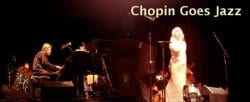 The Chopin Foundation of the United States and Broward Community College’s Visual and Performing Arts Department present “Chopin Goes Jazz ” on February 27th in Davie, Florida. This concert promises to be a spectacular musical event, featuring Andrzej Jagodziński and his Trio with Grażyna Auguścik – one of the most intriguing contemporary vocalists on today’s world jazz scene. Poland’s leading jazz group will interpret the music of Frederick Chopin, arguably the country’s greatest composer, with a female vocal stylist who is described as a “Voice from Heaven.”
The Chopin Foundation of the United States and Broward Community College’s Visual and Performing Arts Department present “Chopin Goes Jazz ” on February 27th in Davie, Florida. This concert promises to be a spectacular musical event, featuring Andrzej Jagodziński and his Trio with Grażyna Auguścik – one of the most intriguing contemporary vocalists on today’s world jazz scene. Poland’s leading jazz group will interpret the music of Frederick Chopin, arguably the country’s greatest composer, with a female vocal stylist who is described as a “Voice from Heaven.”
Well known for capturing the beauty at the heart of a piece, Jagodziński’s arrangements include charming string sounds. The String Quartet of Sarasota will help achieve the magic. Don’t miss this very fresh approach to music of the greatest composers the world knows.
[from the Chopin Foundation of the US website]
Awards
Rutkowski Wins In Hanover
 Polish pianist, Hubert Rutkowski, won the International Chopin Competition in Hanover, Germany. Three scholarship prizes were awarded to Rutkowski, Irina Klimina (Russia) and Helene Tysman (France). Hubert Rutkowski is currently a student in Hochschule für Musik und Theater in Hanover with Prof. Yevgeny Koroliov. He is also preparing to record a CD of works by Julian Fontana for Acte Préalable.
Polish pianist, Hubert Rutkowski, won the International Chopin Competition in Hanover, Germany. Three scholarship prizes were awarded to Rutkowski, Irina Klimina (Russia) and Helene Tysman (France). Hubert Rutkowski is currently a student in Hochschule für Musik und Theater in Hanover with Prof. Yevgeny Koroliov. He is also preparing to record a CD of works by Julian Fontana for Acte Préalable.
Silver Gloria Artis
 Polish singer Jadwiga Rappé has received the silver medal Gloria Artis. The medal is awarded by the Polish Minister of Culture to esteemed artists. Jadwiga Rappé is most known for her oratorio and cantata repertoire but her most famous role was the part of Erda in Wagner’s Ring of The Nibelung cycle of operas, which she performed in Deutsche Oper Berlin, Covent Garden, Royal Opera in Brussels, Wiener Staatsoper and Grand Theatre in Geneva.
Polish singer Jadwiga Rappé has received the silver medal Gloria Artis. The medal is awarded by the Polish Minister of Culture to esteemed artists. Jadwiga Rappé is most known for her oratorio and cantata repertoire but her most famous role was the part of Erda in Wagner’s Ring of The Nibelung cycle of operas, which she performed in Deutsche Oper Berlin, Covent Garden, Royal Opera in Brussels, Wiener Staatsoper and Grand Theatre in Geneva.
Szymczewska Gets “Passport”
 Agata Szymczewska, Polish violinist and winner of the 13th International Wieniawski Competition in Poznań (pictured at right), has received the annual “Passport” award from Polityka magazine. The awards are given to people with special achievements in different areas of life, including arts and music. This year the awards were given for the 14th time. Winners are chosen by selected editors of the magazine.
Agata Szymczewska, Polish violinist and winner of the 13th International Wieniawski Competition in Poznań (pictured at right), has received the annual “Passport” award from Polityka magazine. The awards are given to people with special achievements in different areas of life, including arts and music. This year the awards were given for the 14th time. Winners are chosen by selected editors of the magazine.
Discography
Koh’s Szymanowski Impresses
Karol Szymanowski, Bohuslav Martinu, Béla Bartók
Jennifer Koh, violin; Carlos Kalmar, cond.; Grant Park Orchestra
Cedille Records 089
“Cedille really does set an industry standard for finding intelligent and desirable ways to showcase its artists, and this release is a case in point. After all, there is no shortage of fine young female violinists, but all of Jennifer Koh’s releases for the label have been noteworthy (as have Rachel Barton Pine’s, for that matter). It’s interesting to compare this issue to the recent DG release featuring Nicola Benedetti with the London Symphony. Both contain Szymanowski’s lush and lovely First Violin Concerto, but whereas Benedetti offers a grab-bag of miscellaneous and musically unrelated encores, Koh offers three works for violin and orchestra by three very different Eastern European composers, none of them over-exposed and all of them distinctive. In other words, the complete program is as coherent and well thought-out as the performances are outstanding.
In fact, this performance of the Szymanowski is audibly superior to Benedetti’s, which was very good, regarding both Koh’s security and fullness of tone in her upper register as well as the voluptuous accompaniments provided by Carlos Kalmar and the Grant Park Orchestra. You may feel that Chicago’s “other” orchestra can’t match the LSO, yet not only does the ensemble play extremely well, but Kalmar also is a far more sensitive and imaginative conductor than DG’s Daniel Harding. And if you don’t yet know this concerto, you’re missing quite a treat. It has to be the sexiest, most exotic piece of its kind in the entire repertoire, and this performance really revels in the music’s enchanted atmosphere.”
[excerpted from David Hurwitz’s review on ClassicsToday.com on 6/28/2006]
Chopin Complete Recording
 The independent French recording label Abeille Musique has released a 30-CD box set containing recordings of Frederic Chopin’s complete catalog. Priced in Europe at 39 Euro, this set became an instant bestseller. The pianists performing on these recordings are some of the major names in piano music, including among others: Bella Davidovich, Adam Harasiewicz, Artur Rubinstein, Sergey Rachmaninoff and Vladimir Horowitz. The set includes a 100 page booklet dedicated to Chopin. For detailed information please visit the recording web page .
The independent French recording label Abeille Musique has released a 30-CD box set containing recordings of Frederic Chopin’s complete catalog. Priced in Europe at 39 Euro, this set became an instant bestseller. The pianists performing on these recordings are some of the major names in piano music, including among others: Bella Davidovich, Adam Harasiewicz, Artur Rubinstein, Sergey Rachmaninoff and Vladimir Horowitz. The set includes a 100 page booklet dedicated to Chopin. For detailed information please visit the recording web page .
New Lasoń Music
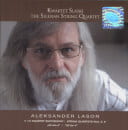 This recent Polish Radio release covers the three latest compositions for string quartet by Aleksander Lasoń: Kwartet smyczkowy “Siedem i pół kwartetu” [“Seven and a Half Quartet”] (2003-04), Fourth String Quartet (2005), and 20 dla 4 [20 for 4] (1998, dedicated to the Silesian Quartet for the 20th anniversary of the creation of the ensemble) recorded by Silesian Quartet (Szymon Krzeszowiec – violin, Arkadiusz Kubica – violin, Łukasz Syrnicki – viola, Piotr Janosik – cello).
This recent Polish Radio release covers the three latest compositions for string quartet by Aleksander Lasoń: Kwartet smyczkowy “Siedem i pół kwartetu” [“Seven and a Half Quartet”] (2003-04), Fourth String Quartet (2005), and 20 dla 4 [20 for 4] (1998, dedicated to the Silesian Quartet for the 20th anniversary of the creation of the ensemble) recorded by Silesian Quartet (Szymon Krzeszowiec – violin, Arkadiusz Kubica – violin, Łukasz Syrnicki – viola, Piotr Janosik – cello).
New From DUX
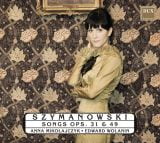 Szymanowski. Songs Op. 31 & 49
Szymanowski. Songs Op. 31 & 49
Karol Szymanowski: Songs of the Fairy-Tale Princess Op. 31, six songs to the texts by Zofia Szymanowska for voice and piano; Children’s Rhymes Op. 49, 20 songs to poems of Kazimiera Iłłakowiczówna for voice and piano
Anna Mikołajczyk – soprano, Edward Wolanin – piano
DUX0547
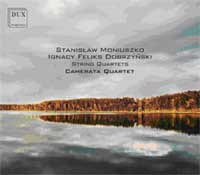 Camerata Quartet. String Quartets
Camerata Quartet. String Quartets
Ignacy Feliks Dobrzyński: String Quartet No. 1 in E minor Op. 7
Stanisław Moniuszko: String Quartet No. 2 in F major; String Quartet No. 1 in D minor
Camerata Quartet: Włodzimierz Promiński – 1st Violin, Andrzej Kordykiewicz – 2nd Violin, Piotr Reichert – viola, Roman Hoffmann – cello
DUX0561
Performances
Jubilee At Łódź Philharmonic
On Friday, January 26, the Łódź Philharmonic in Poland celebrated a double jubilee: the 120th birth anniversary of its patron, Arthur Rubinstein, and the 120th anniversary of the opening of Ignacy Vogel Concert Hall. On this special occasion the Philharmonic gave a concert featuring pianist Krzysztof Jablonski accompanied by the Symphonic Orchestra of the Philharmonic under the baton of Tadeusz Wojciechowski. The program included Chopin’s Piano Concerto no. 2 in f minor, which was one of Arthur Rubinstein’s favourite pieces, Grieg’s Concerto in a minor, and Paderewski’s Polish Fantasy. Three days after the concert in Łódź, on Monday, January 29, the performance was repeated at the Royal Opera in Brussels with minor repertoire changes. Instead of music by Grieg, the program included The Steppe, a symphonic poem by Zygmunt Noskowski.
Celebrating Poland And England
The Concordia Foundation was established in 1994 and became a registered charity in 1995 with Yehudi Menuhin as its patron. It was founded by Gillian Humphreys, international soprano, out of her real concern that it is important to Build Bridges of Friendship and Excellence through Music and the Arts. The foundation continues this effort today with their Pianists of the World series. The most recent installment – A Musical Bridge Between Poland and England – featured Magdalena Zuk, the London Amistad String Orchestra, and the Vardanyan String Quartet, presenting a program of works by Chopin, Szymanowski, Finzi, and Britten.
Magdalena Zuk was born Poland, where she graduated in piano from the Karol Lipiński Academy of Music in 1998. She has participated in piano competitions in Agropoli, Italy, the “Konzerteum” in Marcopoulon, Greece, and master classes at the “Sommerakademie Mozarteum” in Salzburg. Magdalena has given solo recitals in France, Italy, Yugoslavia and Poland, and in 1999, she was the soloist in the Mozart B flat major KV 595 piano concerto at the Grand Amphitheatre de la Sorbonne in Paris, with the International Symphonic Orchestra CROUS de Paris. She was awarded the Grand Prix in the professional category at the 10th Annual Festival of French Song in Lubin, Poland and, from 1998-1999, she studied at the Schola Cantorum in Paris where she received a Diplome de Virtosité. Magdalena gave a Chopin recital at the French première of Roman Polański’s film The Pianist in Paris and she officially represented Poland in the 2004 Saison Polonaise in France with concerts at the Chopin Festival Orangerie de Bagatelle in Paris, the Musée Claude Debussy in Saint Germain-en-Laye, and the Chateau de la Petite-Malmaison. In June 2005, she received a Première Prix de Perfectionnement from the Conservatoire National de Versailles. Magdalena is currently studying at the Royal College of Music.
Stojowski Collection Update
In 2005, the Polish Music Center at USC received a generous donation of manuscripts, sketches, correspondence, and published scores of music by Zygmunt (Sigismond) Stojowski (1870-1946) from the composer’s family. Now known as the Zygmunt & Luisa Stojowski Collection, this new addition to the PM archive consists of 32 boxes of varying sizes. During the summer of 2005, the Stojowski Collection was appraised by a specially hired expert. Although study copies will remain in the Polish Music Center, the originals will reside permanently in Special Collections at the Doheny Library on the USC campus. In the coming months, as the Collection’s detailed inventory is being made, we will continue publishing the contents in our Newsletter, informing our public of this important legacy left by a fascinating and undeservedly forgotten composer. All inquiries regarding the Stojowski Collection should be directed to the Polish Music Center at USC via e-mail to: polmusic@thornton.usc.edu . The following is our report on the contents of Box X of the Stojowski Collection.
[MZ]
Box 10: Stojowski Recordings On CDs
CD-1 TOTAL TIME = 46:22
Recording date: 1936 (?)
REPERTOIRE:
Robert Schumann: The Prophet Bird, Op. 82 no. 7 [3:43]
Sigismond Stojowski : By the Brookside, Op. 30 no. 3 [2:28]
PERFORMER:
Ignace Jan Paderewski, piano
From Victor 1426-A / 1426-B 78rpm commercial recording
Recording date: 1936 (?)
REPERTOIRE:
Claude Debussy: Reflets dans l’eau [4:05]
Sigismond Stojowski : Chant d’amour, Op. 26, no. 3 [4:10]
PERFORMER:
Ignace Jan Paderewski, piano
From Victor 6633-A / 6633-B. 78rpm
Recording date: 1/25/1939
REPERTOIRE:
Sigismond Stojowski: Suite for Orchestra, Op. 9 [26:14]
PERFORMERS:
Brico Symphony Orchestra Antonia Brico, conductor
Carnegie Hall, New York City; Carnegie Recording Co. 78.26rpm (off-air recording)
Recording date: 1943 (?)
REPERTOIRE:
Sigismond Stojowski : Suite for Orchestra , Op. 9, 2 nd movement [5:38]
PERFORMERS:
New York Philharmonic, Grzegorz Fitelberg
U.S. Dept. of State, International Broadcast Division
CD-2 TOTAL TIME = 58:34
Recording date: 1/13/1947
REPERTOIRE:
Sigismond Stojowski : Prelude, Op.1 no. 2; Village Coquette Op. 24 no. 3; ValseHumoresque, Op. 12 no. 2; Variations on a Cracovian Theme, Op. 26 no. 4 PERFORMERS:
Sidney Schachter, piano and Luisa Stojowska, piano
(Station WNYC 8:30 – 8:55 PM) Carnegie Hall Recording Co.
Recording date: 1948 (?)
WNYC-FM broadcast [33:49]
SIDE 1
REPERTOIRE:
Sigismond Stojowski : Solitude, Op. 24 no. 1; Valse Humoresque, Op. 12 no. 2; Speak Once Again, Op. 33 no. 2; Wert Thou the Lake, Op. 33 no. 3; Farewell, Op. 33 no. 5; Deep is My Sorrow, Op. 11 no. 4?; Lilly of the Valley, Op. ???; The Bird, Op.11 no. 5; Variations on a Cracovian Theme, Op. 26 no. 4
PERFORMERS:
Luisa Stojowska, piano, and Maria Bogucka, soprano
SIDE 2 [note put on CD]
[Announcement for Isaac Stern & the New York Philharmonic]
Piano Solo incomplete no id.
Piano Solo incomplete no id.
Piano Solo no id @ 78.26rpm
Test Tones @ 78.26rpm]
Bartok Recording Studio New York City, NY “A Reference Record”
16 inch transcription disc, 33.33rpm NOTE: Only side one was recorded
CD-3 TOTAL TIME = 55:08
Recording date: 4/30/1950
Stojowski Memorial Program
REPERTOIRE:
Sigismond Stojowski: Second Sonata for Violin and Piano in E Major Op. 37 [24:58] PERFORMERS:
Bernice Stochek, violin, and Luisa Stojowska, piano
WNYC WOR Recording – Ser. 28696 – Three 78.26rpm, 12 inch, 5 sides aluminum based lacquers (2.5TE – Flat)
Recording date: 4/30/1952
Stojowski Memorial Program
REPERTOIRE:
Sigismond Stojowski: Sonate pour piano et violoncelle, Op. 18 [25:04]; Chant d’amour, Op. 26 no. 3
PERFORMERS:
Thadeus Brys, cello, Luisa Stojowska, piano
WNYC-WOR Recording – Ser. 54970 – Three 78.26rpm, 12 inch, 5 sides aluminum based lacquers (1.5TE – Flat)
Recording date: 3/6/1953
Mrs. Carriere (FRA-3990 / French / DUB / Origin TR / CH no. 9) [5:05]
Department of State, International Broadcasting Services: “This recording Property of the United States of America ” 33.33rpm. One 12 inch disc, one side, aluminum based lacquer (1.1LP – E5)
CD-4 TOTAL TIME = 51:39
Recording date: 5/14/1953
Stojowski Memorial Program:
Sigismond Stojowski: Melodie, Op. 1 no. 1; Mazurka, Op. 19 no. 5
Sigismond Stojowski, piano (from the 1944 recordings)
Sigismond Stojowski: Speak Once Again, Op. 33 no. 2; Farewell, Op. 33 no. 5
Maria Bogucka, soprano, and Luisa Stojowska, piano
Sigismond Stojowski: Solitude, Op. 24
Luisa Stojowska, piano
Sigismond Stojowski: Scherzo Caprice, Op. 41 no. 2
Trudy Adler, piano
Sigismond Stojowski: By The Brookside, Op. 30, no. 3
Manuel Ledo, piano
Frederic Chopin: Mazurkas, Op. 50 no. 1, Op. 50 no. 2, Op. 56 no. 2
Sigismond Stojowski, piano (from the 1944 recordings)
[29:43]
Recording date: 11/9/1958
Keyboard Masters Program presents Luisa Stojowska in a Sigismond Stojowski Memorial REPERTOIRE:
Sigismond Stojowski: Chant d’amour, Op. 26 no. 3; Mazurka Fantastique, Op. ???; Solitude, Op. 24 no. 1; Barcarolle, Op. 25 no. 4; By The Brookside, Op. 30, no. 3; Variations on a Cracovian Theme Op. 26 no. 4
PERFORMER:
Luisa Stojowska, piano
[21:54]
Anniversaries
Born This Month
- 2 February 1909 – Grazyna BACEWICZ , composer, violinist, pianist (d. 1969)
- 7 February 1877 – Feliks NOWOWIEJSKI, composer, organist
- 8 February 1953 – Mieszko GÓRSKI, composer, teacher (active in Gdansk and Koszalin)
- 9 February 1954 – Marian GORDIEJUK, composer, teacher, theorist (active in Bydgoszcz)
- 14 February 1882 – Ignacy FRIEDMAN, pianist and composer (d. 1948)
- 18 February 1881 – Zygmunt MOSSOCZY, opera singer (bass), chemist (d. 1962)
- 27 February 1898 – Bronislaw RUTKOWSKI, organist, music critic, conductor and composer (d. 1964)
- 28 February 1910 – Roman MACIEJEWSKI , composer, pianist (d. 1998 in Sweden)
- 28 February 1953 – Marcin BLAZEWICZ, composer, teacher (active in Warsaw)
Died This Month
- 3 February 1959 – Stanislaw GRUSZCZYNSKI, tenor (active throughout Europe, b. 1891)
- 3 February 1929 – Antoni Wawrzyniec GRUDZINSKI, pianist, teacher, and music critic (active in Lódz and Warsaw, b. 1875)
- 7 February 1954 – Jan Adam MAKLAKIEWICZ, composer (active in Warsaw, b. 1899)
- 7 February 1994 – Witold LUTOSLAWSKI , composer and conductor (b. 1913)
- 8 February 1909 – Mieczyslaw KARLOWICZ , composer, conductor, writer (b. 1876)
- 9 February 1959 – Ignacy NEUMARK, composer and conductor (active in Copenhagen, Oslo and Schveningen, b. 1888)
- 10 February 1905 – Ignacy KRZYZANOWSKI, pianist and composer (active in Kraków and Warsaw, b. 1826)
- 14 February 1957 – Wawrzyniec Jerzy ZULAWSKI, composer, music critic, teacher, and mountain climber (b. 1916)
- 23 February 1957 – Stefan SLAZAK, singer, organist, conductor (active in Silesia, b. 1889)
- 27 February 1831 – Józef KOZLOWSKI, composer (active at the Russian Court in Petersburg, b. 1757)
- 29 February 2004 – Witold RUDZINSKI, composer, music critic and teacher